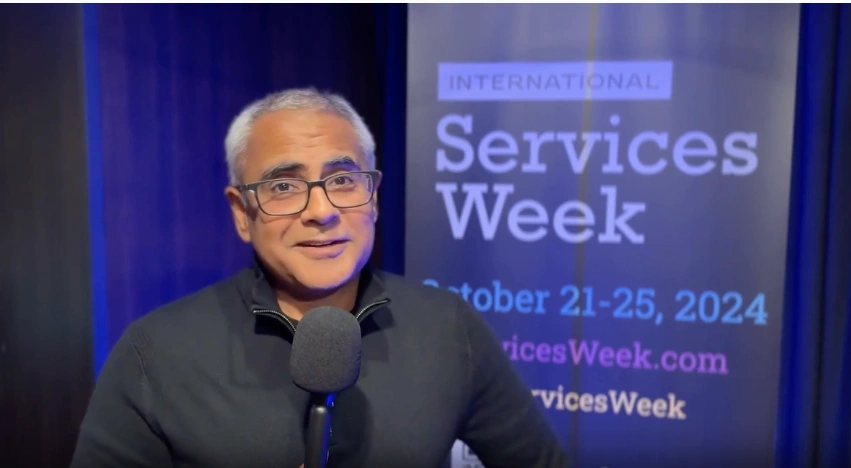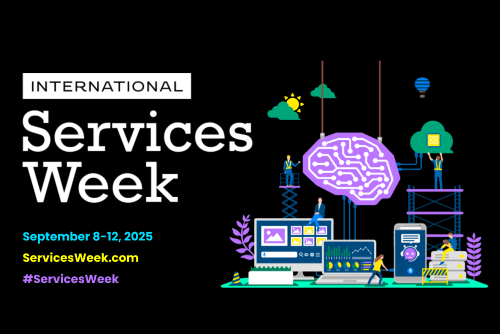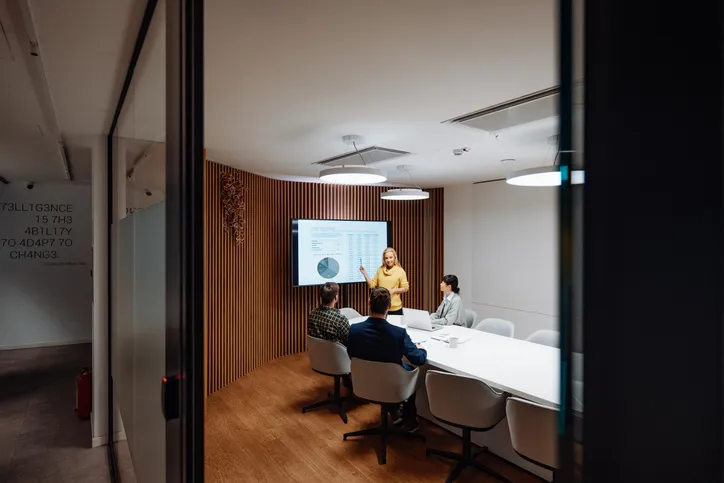What will the next 10 years hold for the professional services industry?

Ten years ago, if someone told you we’d be talking about AI avatars, hyper-personalization, and virtual service delivery as standard practice, would you have believed it?
Yeah, me neither. And yet… here we are.
For International Services Week, we thought it’d be interesting to look ahead and speculate about what changes the next ten years might bring for our industry. We gathered insights from leaders and practitioners across the field to share their predictions for the next decade.
Autonomous AI Agents
Let’s be honest; we’re all thinking about AI. Raju Malhotra, our Chief Product & Technology Officer, put it best when he said, “AI’s impact will be on par with the rise of the internet and mobile technology. We’re going to see AI not just augmenting human work, but taking on key operational roles with fully autonomous agents.”
Raju’s prediction is spot on. We’re not just talking about chatbots and basic automation anymore. The rise of autonomous agents means AI is about to take an even greater strategic role in how we work and deliver services.
Supercharged Resource Management
Nana Gregg, Senior Solutions Architect at Diabsolut, predicted that “AI will revolutionize the way we allocate resources, ensuring the right person is matched to the right task at the right time.
AI as your 24/7 resource manager? Yes, please! This not only improves customer outcomes but also prevents employee burnout, making operations smarter and more efficient without overwhelming your team. (Shameless plug: I recently wrote about how resource management is an ideal early use case for pragmatic AI deployments in services businesses!)
Personalization and the Customer Experience
Leah Clark, Senior Director of Customer Success and Adoption at Certinia, outlined a vision for hyper-personalization: “We’re moving toward a time where customer interactions will be deeply personalized, with AI crafting tailored journeys for every individual.” She believes AI will help us create more meaningful, individualized customer experiences where each engagement feels 100% unique.
Salesforce Senior Director Chris Petty also shared his take on how personalization will drive the next decade of services. “It’s going to be crucial for services departments to personalize the way we interact with customers, matching the right resource with the right topic at the right time.” He emphasized that by understanding skill sets and leveraging data, businesses can “show up for customers in a way that truly addresses their needs, not just what we want to offer.”
The Growing Complexity of Financial Compliance
Brandon Cole, Senior Sales Executive at Avalara, offered a prediction that finance teams can’t afford to ignore: “Sales tax will only get more complex. States will start taxing more services that were traditionally non-taxable, which means businesses will have to comply in more places.”
He believes this added complexity will place a significant strain on internal resources, driving businesses to seek new ways to manage compliance more efficiently. With tax laws evolving faster, automation tools will be essential to keeping your business focused on what really matters: growing.
Unified Model of Service Delivery
Will Spice, Vice President of Product Management at Certinia, envisions a future where “resources can be optimized continually,” with AI taking on non-value-adding tasks to boost productivity. Will predicts that resource plans will be generated based on best practices and specific needs, creating a “world of one”—a model where a single, highly skilled professional, supported by AI, delivers a full lifecycle of services to the customer.
“Technology-wise, I’m really confident that’s achievable,” he said. But he also acknowledged the bigger challenge will be managing the “organizational and human alignment” needed to bring that vision to life.
Upskilling and Human-Centric Leadership
Another key theme that emerged was the future of leadership and the importance of soft skills. Kameliya Krastanova, a consultant with SoftServe, shared that in a world powered by AI, “…we’ll be able to upskill and empower lower-level workers, and put much more attention on developing their human skills, soft skills, building a leadership mentality, and empathy.”
I love this perspective because it reinforces something we’ve all been thinking: the future is human. AI will handle the busy work, but it’s the people who will bring the creativity, leadership, and strategic thinking to the table.
What’s Next?
While none of us have a crystal ball, it’s clear from these insights that the next decade will bring major shifts in how we operate. AI, automation, and hyper-personalization are going to create new challenges, but also incredible opportunities.
So now, it’s your turn: How do YOU think the services industry will evolve in the next ten years? Share your thoughts using the hashtag #ServicesWeek on social media. Let’s start the conversation now… before we all turn into AI-powered holograms.
Recent Articles
Maximize your Salesforce investment with Certinia







